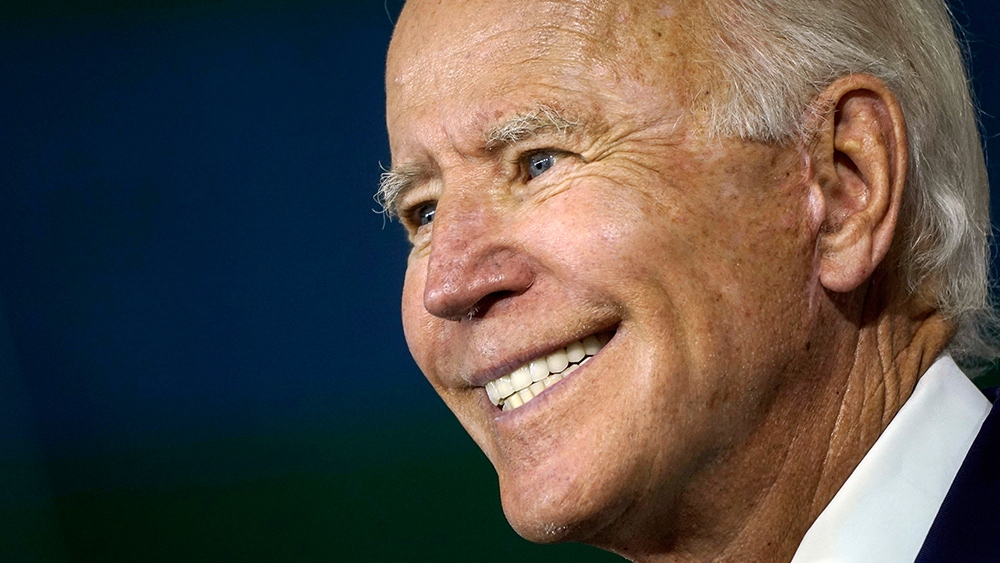How could we have been so naive about big tech?
09/27/2022 / By News Editors
The 1998 movie Enemy of the State starring Gene Hackman and Will Smith seemed like fiction at the time. Why I didn’t regard that movie – which still holds up in nearly every detail – as a warning I do not know. It pulls back the curtain on the close working relationship between national security agencies and the communications industry – spying, censorship, blackmailing, and worse. Today, it seems not just a warning but a description of reality.
(Article by Jeffrey A. Tucker republished from BrownStone.org)
There is no longer any doubt at all about the symbiotic relationship between Big Tech – the digital communications industry in particular – and government. The only issue we need to debate is which of the two sectors are more decisive in driving the loss of privacy, free speech, and liberty in general.
Not only that: I’ve been involved in many debates over the years, always taking the side of technology over those who warned of the coming dangers. I was a believer, a techno-utopian and could not see where this was headed.
The lockdowns were the great shock for me, not only for the unconscionably draconian policies imposed on the country so quickly. The shock was intensified by how all the top tech companies immediately enlisted in the war on freedom of association. Why? Some combination of industry ideology, which shifted over 30 years from a founding libertarian ethos to become a major force for techno-tyranny, plus industry self-interest (how better to promote digital media consumption than to force half the workforce to stay home?) were at work.
For me personally, it feels like betrayal of the most profound sort. Only 12 years ago, I was still celebrating the dawning of the Jetsons World and dripping with disdain for the Luddites among us who refused to get with it and buy and depend on all the latest gizmos. It seemed inconceivable to me at the time that such wonderful tools could ever be taken over by power and used as a means of social and economic control. The whole idea of the Internet was to overthrow the old order of imposition and control! The Internet was anarchy, to my mind, and therefore had some built-in resistance to all attempts to monopolize it.
And yet here we are. Just this weekend, The New York Times carries a terrifying story about a California tech professional who, on request, texted a doctor’s office a picture of his son’s infection that required a state of undress, and then found himself without email, documents, and even a phone number. An algorithm made the decision. Google has yet to admit wrongdoing. It’s one story but emblematic of a massive threat that affects all our lives.
Amazon servers are reserved only for the politically compliant, while Twitter’s censorship at explicit behest of the CDC/NIH is legion. Facebook and Instagram can and does bodybag anyone who steps out of line, and the same is true of YouTube. Those companies make up the bulk of all Internet traffic. As for escaping, any truly private email cannot be domiciled in the US, and our one-time friend the smartphone operates now as the most reliable citizen surveillance tool in history.
In retrospect, it’s rather obvious that this would happen because it has happened with every other technology in history, from weaponry to industrial manufacturing. What begins as a tool of mass liberation and citizen empowerment eventually comes to be nationalized by the state working with the largest and most politically connected firms. World War I was the best illustration of just such an outrage in the 20th century: the munitions manufacturers were the only real winners of that one, while the state acquired new powers of which it never really let go.
It’s hard to appreciate just what a shock that “Great War” was to a whole generation of liberal intellectuals. My mentor Murray Rothbard wrote an extremely thoughtful reflection on the naive liberalism of Victorian-age techno enthusiasts, circa 1880-1910. This was a generation that saw progress emancipation on every front: the end of slavery, a burgeoning middle class, the crumbling of the old aristocracies of power, and new technologies. All these enabled the mass production of steel, cities rising to the heavens, electricity and lighting everywhere, flight, and countless consumer improvements from indoor plumbing and heating to mass availability of food that enabled enormous demographic shifts.
Reading the greats from that period, their optimism about the future was palpable. One of my favorite writers, Mark Twain, held such a view. His moral outrage toward the Spanish-American War, the remnants of family feuds in the South, and reactionary class-based biases were everywhere in his writings, always with a sense of profound disapproval that these signs of revanchist thinking and behaving were surely one generation away from full expiration. He shared in the naivete of the times. He simply could not have imagined the carnage of the coming total war that made the Spanish-American war look like a practice drill. The same outlook on the future was held by of Oscar Wilde, William Graham Sumner, William Gladstone, Auberon Herbert, Lord Acton, Hillaire Belloc, Herbert Spencer, and all the rest.
Rothbard’s view was that their excessive optimism, their intuitive sense of the inevitability of the victory of liberty and democracy, and their overarching naivete toward the uses of technology actually contributed to the decline and fall of what they considered civilization. Their confidence in the beautiful future – and their underestimate of the malice of states and the docility of the public – created a mindset that was less driven to work for truth than it otherwise would have been. They positioned themselves as observers of ever-increasing progress of peace and well-being. They were the Whigs who implicitly accepted a Hegelian-style view of their invincibility of their causes.
Of Herbert Spencer, for example, Rothbard wrote this scathing criticism:
Spencer began as a magnificently radical liberal, indeed virtually a pure libertarian. But, as the virus of sociology and Social Darwinism took over in his soul, Spencer abandoned libertarianism as a dynamic historical movement, although at first without abandoning it in pure theory. In short, while looking forward to an eventual ideal of pure liberty, Spencer began to see its victory as inevitable, but only after millenia of gradual evolution, and thus, in actual fact, Spencer abandoned Liberalism as a fighting, radical creed; and confined his Liberalism in practice to a weary, rear-guard action against the growing collectivism of the late nineteenth-century. Interestingly enough, Spencer’s tired shift “rightward” in strategy soon became a shift rightward in theory as well; so that Spencer abandoned pure liberty even in theory.
Rothbard was so sensitive to this problem due to the strange times in which his ideological outlook took shape. He experienced his own struggle in coming to terms with the way in which the brutality of real-time politics poisons the purity of ideological idealism.
The bulk of the Rothbardian paradigm had been complete by the time he finished his PhD in economics from Columbia University. By 1963-1964, he published his massive economic treatise, a reconstruction of the economics of the origins of the Great Depression, and put together the core of the binary that became his legacy: history is best understood as a competitive struggle between market and state. One of his best books on political economy – Power and Market – that appeared years later was actually written in this period but not published because the publisher found it too controversial.
Implicit in this outlook was a general presumption of the universal merit of free enterprise compared with the unrelenting depredations of the state. It has the ring of truth in most areas of life: the small business compared with the plotting and scamming of politics, the productivity and creativity of entrepreneurs vs the lies and manipulations of bureaucratic armies, the grimness of inflation, taxation, and war vs the peaceful trading relationships of commercial life. Based on this outlook, he became the 20th century’s foremost advocate of what became anarcho-capitalism.
Rothbard also distinguished himself in those years for never joining the Right in becoming a champion of the Cold War. Instead he saw war as the worst feature of statism, something to be avoided by any free society. Whereas he once published in the pages of National Review, he later found himself as the victim of a fatwa by Russia-hating and bomb-loving conservatives and thereby began to forge his own school of thought that took over the name libertarian, which had only recently been revived by people who preferred the name liberal but realized that this term had long been appropriated by its enemies.
What happened next challenged the Rothbardian binary. It was not lost on him that the major driving force beyond the building of the Cold War security state was private enterprise itself. And the conservative champions of free enterprise had utterly failed to distinguish between private-sector forces that thrive independently of the state and those who not only live off the state but exercise a decisive influence in further fastening the yoke of tyranny on the population through war, conscription, and general industrial monopolization. Seeing his own binary challenged in real life drove him to found an intellectual project embodied in his journal Left and Right, which opened in 1965 and ran until 1968. Here we find some of the most challenging writing and analysis of the second half of the twentieth century.
The first issue featured what might be his most mighty essay on political history: “Left, Right, and the Prospects for Liberty.” This essay came from a period in which Rothbard warmed up to the left simply because it was only on this side of the political spectrum where he found skepticism of the Cold War narrative, outrage at industrial monopolization, disgust at reactionary militarism and conscription, dogged opposition to violations of civil liberties. and generalized opposition to the despotism of the age. His new friends on the left in those days were very different from the woke/lockdown left of today, obviously. But in time, Rothbard too soured on them and their persistence in economic ignorance and un-nuanced hatred of capitalism in general and not just the crony variety.
So on it went through the decades as Rothbard was drawn ever more toward understanding class as a valuable desiderata of political dynamics, large corporate interests in a hand-in-glove relationship to the state, and the contrast between elites and common people as an essential heuristic to pile on top of his old state vs market binary. As he worked this out more fully, he came to adopt many of the political tropes we now associate with populism, but Rothbard was never fully comfortable in that position either. He rejected crude nationalism and populism, knew better than anyone of the dangers of the Right, and was well aware of the excesses of democracy.
While his theory remained intact, his strategic outlook for getting from here to there underwent many iterations, the last of which before his untimely death in 1995 landed him with an association with the burgeoning movement that eventually brought Trump to power, though there is every reason to believe that Rothbard would have regarded Trump as he did both Nixon and Reagan. He saw them both as opportunists who talked a good game – though never consistently – and ultimately betrayed their bases with anti-establishment talk without the principle reality.
One way to understand his seeming shifts over time is the simple point with which I began this reflection. Rothbard dreamed of a free society, but he was never content with theory alone. Like the major intellectual activists who influenced him (Frank Chodorov, Ludwig von Mises, and Ayn Rand) he believed in making a difference in his own time within the intellectual and political firmament he was given. This drove him toward ever more skepticism of corporate power and the privileges of the power elite in general. By the time of his death, he had traveled a distance very far from the simple binaries of his youth, which he had to do in order to make sense of them them in the face of grim realities of the 1960s through the 1990s.
Would he have been shocked as I have been about the apostasies of Big Tech? Somehow I doubt it. He saw the same thing with the industrial giants of his own time, and fought them with all his strength, a passion that led him to shifting alliances all in the interest of pushing his main cause, which was the emancipation of the human population from the forces of oppression and violence all around us. Rothbard was the Enemy of the State. Many people have even noted the similarities of Gene Hackman’s character in the movie.
The astonishing policy trends of our time are truly calling on all of us to rethink our political and ideological opinions, as simple and settled as they might have been. For this reason, Brownstone publishes thinkers on all sides. We are all disaffected in our own ways. And we know now that nothing will be the same.
Do we give up? Never. During lockdowns and medical mandates, the power of the state and its corporate allies truly reached its apotheosis, and failed us miserably. Our times cry out for justice, for clarity, and for making a difference to save ourselves and our civilization. We should approach this great project with our eyes wide open and with ears to hear different points of view on how we get from here to there.
Read more at: BrownStone.org
Submit a correction >>
Tagged Under:
big government, Big Tech, Censorship, computing, conspiracy, corruption, cyber war, deception, enslaved, fascism, free speech, freedom, Glitch, information technology, Liberty, privacy watch, Social media, surveillance, tech giants, technocrats, Tyranny
This article may contain statements that reflect the opinion of the author
RECENT NEWS & ARTICLES
COPYRIGHT © 2017 COMPUTING NEWS



















